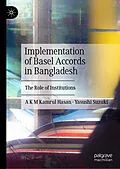This book analyzes the impact of Basel Accord in Bangladesh. More specifically, it focuses on the credit risk homogenization under standardized approach of Basel Accord where External Credit Rating Agencies (ECAIs) are allowed to rate the exposures, the potential risk of allowing sub-ordinated debt (Sub-debt) as Tier 2 capital, and multiple bank distress cases as a real-world scenarios.
Autorentext
A K M Kamrul Hasan has received his Ph.D. from Ritsumeikan Asia Pacific University. His research interests include banking regulation, corporate governance, venture capital, and innovation driven enterprise finance. His works have appeared in several peer-reviewed international journals including Financial Internet Quarterly, International Journal of Economics, Management and Accounting, International Journal of SME Development, and BAUET Journal.
Yasushi Suzuki is a Professor of Finance at the College of International Management, Ritsumeikan Asia Pacific University, Japan. His primary research interest focuses on the institutional political economy and financial development.
Inhalt
Chapter 1: Introduction
Chapter 2: BIS and the Basel Accord- Looking Back at History
Chapter 3: Theoretical Discussion on Banking Business Model and Banking
Regulations
Chapter 4: Basel Accords Associated Institutions in Bangladesh
Chapter 5: External Credit Ratings Agencies Incentive and Liability in ExposureRating
Chapter 6: Sub-ordinated Debt: A Skeptical Component of Regulatory Capital
Chapter 7: Cases of Bank Distress
Chapter 8: The Building Blocks to Design Robust and Effective Capital Regulation
Chapter 9: Conclusion
